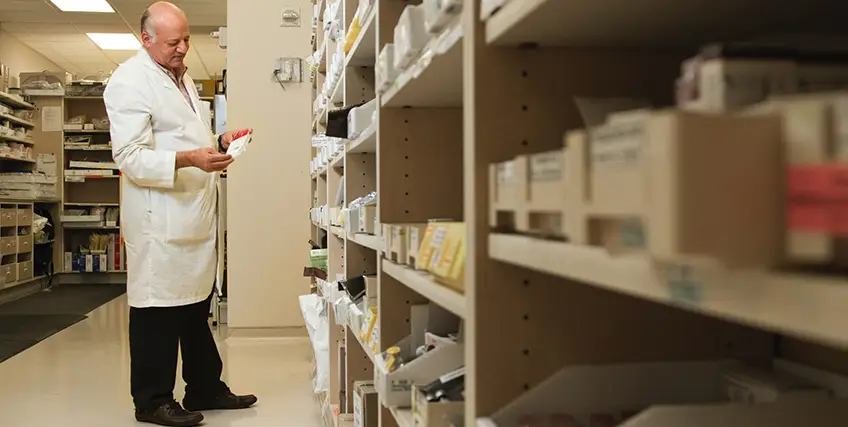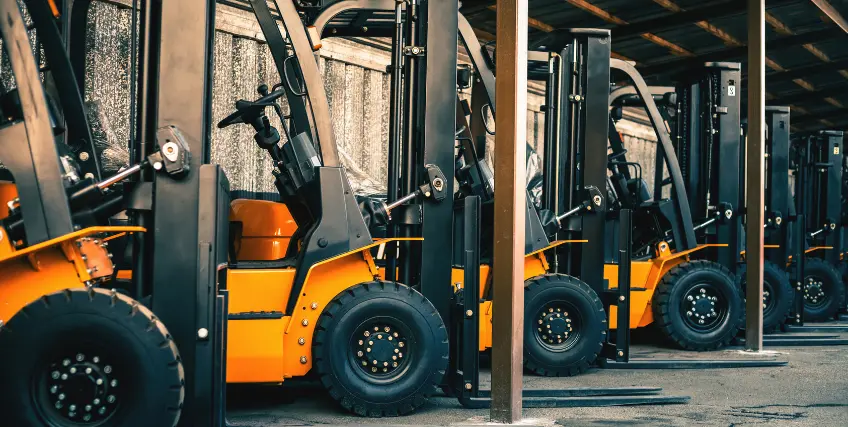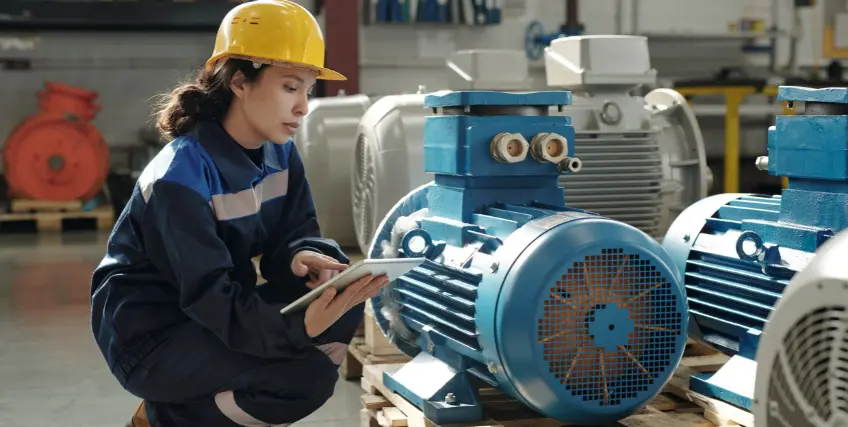Top 4 Types of Business Loans for Equipment Financing
March 24, 2025 | Last Updated on: March 24, 2025

Finding capital can be a consistent challenge for small business owners. Many types of business financing options are available, and it may feel overwhelming to figure out which makes the most sense for your situation. However, a few options stand out if you’re exploring small business loans for equipment financing.
In this article:
- The top small business equipment loan options
- How to get equipment funding
- How to choose the best equipment loan for startup businesses and established businesses
What is equipment financing?
Equipment financing, or an equipment loan, is a loan used to purchase a piece of equipment. This could be a vehicle, a construction machine, a piece of factory equipment, a commercial oven, or any other kind of equipment necessary for your business.
Typically, an equipment loan uses the equipment itself as collateral. That means that if you fail to repay the loan, the lender may repossess the equipment. Equipment financing loans allow businesses to get the necessary equipment without paying full price upfront. Instead, they pay a down payment, and then a monthly payment to the lender that includes interest.
Some business owners also opt for an equipment lease as an equipment financing option rather than buying equipment outright.
However, equipment loans aren’t the only way to finance an equipment purchase.
Top business loans for equipment financing
While equipment loans are convenient, they’re not the only type of equipment financing available. These are some of the most common equipment funding options used by entrepreneurs.
Equipment loan
Technically, an equipment loan is a type of term loan. However, they’re worth their own category here because they are typically issued and managed a bit differently than a conventional term loan.
An equipment loan’s funds are tied directly to the item or items purchased, and the equipment generally serves as collateral to secure the loan. That means that, unlike a term loan, no money is issued to the borrower. Instead, the lender pays the equipment seller directly while you, the borrower, must repay the lender according to the loan agreement. Failure to do so will result in losing the equipment.
Many manufacturers and retailers offer on-site equipment loans, much like you might find at a car dealership. On-site financing, like at a tractor or construction equipment dealer, allows buyers to shop for equipment and get approved for a loan almost immediately. Dealers and retailers often offer incentives and rebates to make equipment purchases more affordable, and allow you to bypass the complication of working with a lender.
Term loans
If you have bigger plans for your business, term loans provide an upfront, lump sum deposit that you can use for a variety of business needs, including equipment purchases. Term loans are the most common type of small business loan and what most people would consider traditional loans.
The typical process for a term loan is:
- A borrower applies for a loan with their financials and business plan.
- Once approved, the loan funds are issued in a lump sum to be used for business purposes stated in the loan application and other business needs.
- The borrower repays the loan over a set period of time, usually in monthly payments plus interest outlined in the loan terms.
- Once the borrower pays back the loan, they are released from the liabilities of the loan agreement.
Term loans are useful because they allow business owners to use the funds for a variety of business purposes. If you need equipment funding but you also want to invest in marketing and hire a few new employees, a term loan can check those boxes. However, they do have some drawbacks, especially for startups and business owners with bad credit. These include:
- Strict eligibility requirements: Traditional lenders like banks and credit unions often have high minimum credit score requirements, time in business requirements, and annual revenue minimums. Online lenders often have more lenient requirements, but may have higher interest rates or lower loan amounts.
- Longer wait times and terms: Traditional term loans have a longer underwriting and approval process than equipment loans, and often have longer repayment terms. That’s because they tend to be for larger sums of money than just the equipment cost. Additionally, underwriting may be stricter, making the process longer.
While government organizations like the U.S. Small Business Administration (SBA) aims to make term loans more accessible for small businesses, SBA loans still have strict requirements that may disqualify new business owners or those with bad credit.
Ultimately, term loans may not be the best equipment loan for startup businesses, but are good options for established businesses ready to expand.
Business lines of credit
A business line of credit is a mix between a business credit card and a term loan. If you need funding on a revolving basis, lines of credit can offer a more affordable and flexible alternative to either of those options.
With a line of credit, you’re approved for a maximum credit amount, but rather than pay interest on that amount, you only pay interest on the amount you withdraw. Like a credit card, once you pay back the amount you borrowed, plus interest, you’ll have access to the full line of credit again. Also like a credit card, you can use a business line of credit like cash, paying for all kinds of business needs, including equipment funding.
Business lines of credit can have much higher limits than credit cards, allowing them to function like a small business equipment loan as well as a conventional term loan.
Some of the advantages of lines of credit include:
- Lower qualification requirements: Business lines of credit tend to be easier to qualify for, especially for those with bad credit who need to rebuild their credit.
- Fast funding: Whenever you draw from a business line of credit, the money goes straight into your business bank account, allowing you to get much faster access to capital than you would if you had to apply for a new loan.
- Flexibility: Unlike a specific equipment loan, you can use a line of credit for all kinds of business purchases.
Short-term loans
Short-term loans are those that have a shorter repayment window than conventional term loans, usually within 18 months. Sometimes referred to as working capital loans, these loans tend to be for smaller sums of money and have higher interest rates, although that’s not always the case.
Short-term loans often have less strict qualification requirements, making them compelling options for business owners with bad credit and startups. You can use them as an equipment loan or to pay for other business needs.
These types of loans are often riskier than business lines of credit or traditional equipment loans and may carry significant origination fees or penalty fees. While they can work as equipment loans if you’re sure the new equipment will generate a strong return on your investment, it’s wise to exhaust other financing options first.
How to choose the right small business equipment loan
An equipment financing loan is a big decision for your business. When considering equipment loans, weigh these factors:
- Lenders: Always shop and compare loan programs when you’re looking for any type of business funding. Traditional banks may offer lower interest rates, but online lenders may offer the fastest funding and easiest process. Also, remember that many equipment dealers offer their own equipment loans to simplify buying.
- Business financials: Before applying for a loan, know your personal credit score, business credit score, current cash flow, and your business’s financial health. It’s a good idea to gather financial statements and tax returns before shopping for equipment to understand what kind of financing you can afford.
- Business needs: Depending on your business’s situation, you may need more than an equipment loan. If you have many upcoming expenses or big expansion plans, a term loan may provide more financial flexibility than lines of credit or equipment loans.
If you have good credit and want low interest rates, an equipment loan tied directly to a piece of equipment may be your best bet. Term loans can be a better option if you have more substantial goals for funding than just buying equipment. A business line of credit is one of many solutions for new businesses or business owners with bad credit.
Final Thoughts
Many businesses require expensive, specific equipment to thrive. Whether you’re a brand new business, you’re pivoting into a new opportunity, or it’s just time for an upgrade of old equipment, it’s imperative to find the right equipment loan for your situation. While you can get specific equipment financing loans, using more flexible types of financing like term loans or lines of credit may help you cover more funding needs.
Regardless of the equipment funding you think you need, you should always do your due diligence on lenders and loan products to ensure you can afford a loan.
FAQs on Equipment Loans
What is an equipment loan?
An equipment loan, is a loan used to purchase a piece of equipment. While many equipment financing loans are tied directly to the equipment itself, you may also use other types of loans and funding to purchase equipment.
What are the best equipment financing loans?
The best ways to purchase equipment include equipment loans, term loans, and business lines of credit.
Do equipment loans use the equipment as collateral?
Yes, typically an equipment loan uses the piece of equipment to secure the loan, meaning the lender may repossess the equipment if you fail to pay back the loan.
Can you get an equipment loan for startup businesses?
Yes, startups can get equipment loans. Many new businesses struggle to get conventional term loan funding so using direct equipment loans or a business line of credit is a better option.




